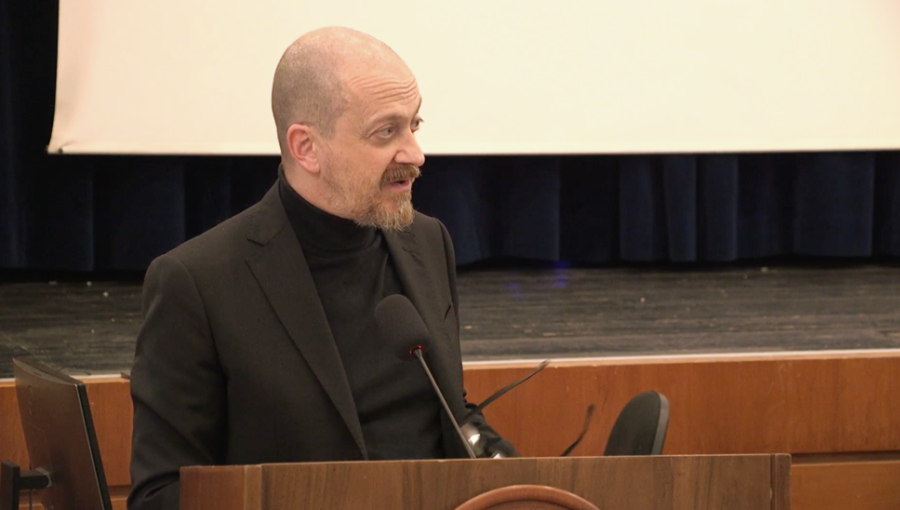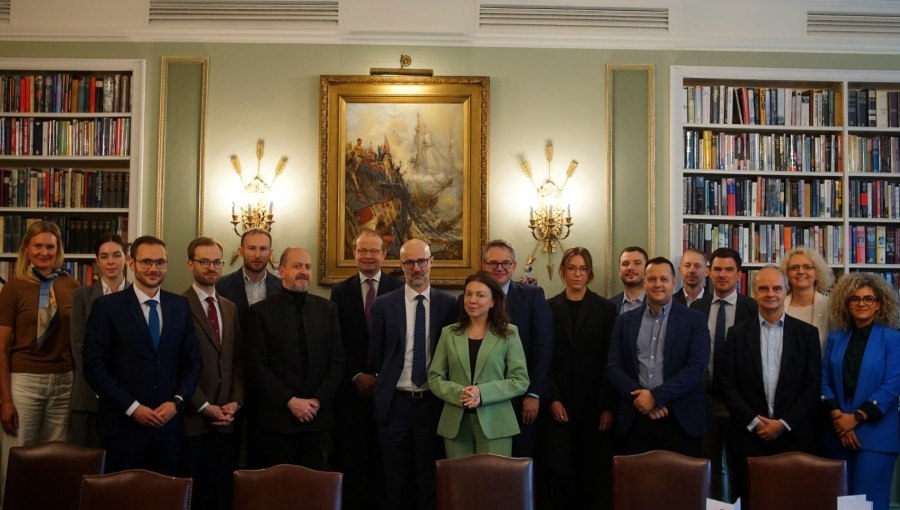JCU Launches Tech and Peace Global Initiative with UN Centennial Program

Francesco Lapenta
On October 25, the Institute of Future and Innovation Studies had the honor to host the symposium “Technology for Peace and Democracy in the Age of Global Enlightenment” at John Cabot University in Rome, Italy. The symposium was organized by the Institute in partnership with Boston Global Forum (BGF) and the United Nations Centennial Initiative, with the support of UN Under-Secretary-General, Tech Envoy Amandeep Gill, and within the program of Festival of Diplomacy. The symposium was initiated as an effort to create a future vision of technological development and regulation aimed at promoting the use of technology for peace, democracy, and the planet. The symposium was inspired and guided by the book Remaking the World – The Age of Global Enlightenment (2021), published as a joint initiative by BGF and the United Nations Academic Impact as part of the United Nations Centennial Initiative. The book, which includes contributors by distinguished global leaders, seeks to foster discussions to pave the way for a global diplomatic effort to create a more humane, peaceful, and secure world by ethically leveraging the potential of existing and emerging technologies.
Participants in the symposium hosted in Rome in connection with Boston and Tokyo united Europe, the United States and Asia for the launch of the initiative.
Opening Remarks
Franco Pavoncello, President of John Cabot University
Francesco Lapenta, Director Institute of Future and Innovation Studies (host and moderator)
Michael Dukakis, Former Democratic Party Nominee for President of the United States
Speakers
Ramu Damodaran, Co-chair of United Nations Centennial Initiative
Zlatko Lagumdzija, former Prime Minister of Bosnia & Herzegovina
Mats Karlsson, former Vice President of World Bank
Yasuhide Nakayama, former Japanese State Minister of Defense
Alex ‘Sandy’ Pentland, MIT Professor
Zaneta Ozolina, Professor and Chairwoman of LATO and Riga Conference
Roland Schatz, CEO of Media Tenor and Founder and CEO UNGSII Foundation
Allain Cyntryn, Former CTO of Goldman Sachs
Closing remarks
Tuan Nguyen, CEO of Boston Global Forum
The symposium was inaugurated by the President of John Cabot University (JCU), Franco Pavoncello.
President Pavoncello said the symposium is important because “we are faced with a dilemma of the relationship between technology and democracy.” While technological means are currently held by a few, their challenges are felt globally and individually. President Pavoncello stated that “technological transformations have not been accompanied by ideological renewal – the world is still largely ruled by centuries old ideological schemes.” How to redefine freedom and a decent life in a globalized and digitized world is a sociotechnical dilemma. President Pavoncello emphasized the importance of the symposium because “we are faced with a dilemma of the relationship between technology and democracy.” While technological means are currently held by a few, their challenges are felt globally and individually. President Pavoncello called this “an age of scientific singularity” with “unprecedented planetary opportunities and challenges, where everything is connected, and the very concept of time and distance seems to be eliminated.” “The march towards greater enlightenment lies first and foremost on how younger generations share this endeavor,” said President Pavoncello. Global enlightenment depends on education. Teachers should “provide students with empathy, curiosity, attention to the unfamiliar, and a critical mind”. These traits are needed to make younger generations aware of technological and scientific advancements. “A world of great problems but also, let us be sure, of great promises,” said President Pavoncello. President Pavoncello concluded that as JCU celebrates its fiftieth anniversary of bridging cultures and nations, this symposium bridges technology for peace globally.
While the Russian invasion of Ukraine might make diplomatic global solutions seem futile, Institute’s Director Lapenta emphasized that it is precisely in this difficult time when we should be reminded of “the necessity of the pathway of global diplomacy and peace” in the challenges that await us in both present and the future. Director Lapenta further stated that we should not abandon the will to find a solution through diplomatic ends, as diplomacy should remain the major way to tackle any of the issues and challenges that we will have to deal with on a global and local scale. To foster dialogue between global actors with a focus on technology requires us to rethink “how can we frame technology as a driver of peace rather than constant competition,” Director Lapenta explained. Lapenta noted that democratic values and technological progress have clashed throughout history. “Technology-democracy relation is thus never simple or simple enough,” Lapenta said. He stressed that “we must be able to develop a future vision that uses technology to address a collective and fair way of approaching social, geopolitical, ecological and economic challenges” to preserve democracy. The current historical moment requires a strong commitment to democracy and solidarity to create a new global roadmap of technology for peace. “We have to choose now, but we have to keep the long-term perspective” in global crises like climate change and war. Long-term thinking applies to environmental and security decisions.
The concept of truth is pivotal because “one can never have peace in the world of lies,” Karlsson, former vice-president of the world bank, said. Truth calls for open-mindedness. European participation in technology of peace, Lagumdzija former prime minister of Bosnia & Herzegovina argued, should be a common endeavor that is not limited by arbitrary borders, such as the European Union or the Schengen area. He argued that Europe should become one of the global pillars of digital foundations alongside Japan, India, and the United States of America.
By creating a system of data measurement which related to different SDGs, technology was not only allowing to track the variables and progress of SDGs implementation, Schatz CEO of UNGSII Foundation explained, but also to create strategies and understanding on how to achieve them. The same type of data measurement, Professor Pentland added, can be used to measure social polarization. Research of this type has already been performed, Professor Pentland explained, “especially in the US context, where society is very polarized right now, between Democrats and Republicans.” The research revealed that both sides had a highly distorted view of the other side, yet once they were exposed to the other’s side’s opinions and reasonings, they found more common ground than they had expected. The challenge today is to reconcile the nonlinear relation between data and truth.
“Truth matters,” Professor Pentland stated, and one way of championing truth is by “challenging the distorted view of the other side.” A completely centralized collection and interpretation of data causes unavoidable temptation of tweaking the results once data is collected by one institution, one corporation or one government. For example, the social media are designed in such a way that “they give the false sense that everybody on the other side quite crazy,” Professor Pentland furthered explained. One solution to this distortion is the promise of Web 3.0, which promises to allow one to be in charge of one’s own data. Professor Pentland stated that it is a crucial step towards truth to give “data in hands of people,” a premise which has begun to be implemented in Singapore. Global agreement is needed to create mechanisms of control and transparency of data collection. Professor Pentland concluded that “it is always in the interest of tyrants to lie about the other side, yet it is possible to dig holes of truth in tyrants’ backyard of lies”.
Professor Žaneta Ozoliņa, the Chairwoman of the Board of Latvian Transatlantic Organization emphasized the need to bolster imperatives of sustainable competition between technological, scientific, corporate, and governmental communities. But also focused on the individual, stating that cultivating personal elements of peace can be achieved by fostering education with a strong international focus.
Damodaran, chair of the UN Centennial Initiative, highlighted that an international education is not a slogan but should be a standard of what and how to teach. Damodaran added that in the current troubling times to teach internationally, is “to teach the hearts and minds around the world, because while so far the world is not that much enlightened, it is definitely global.” Protecting digital infrastructure is a global responsibility. In speaking of bolstering imperatives of sustainable competition between technological, scientific, corporate, and governmental communities, Damodaran referred to Director’s Lapenta book on AI and the concepts of tech diplomacy.
Allain Cyntryn, the former CTO of Goldman Sachs, pointed out that computation and digital technology inverted millennially old social structures. “The main challenge today, which is the main challenge for young people,” Cyntryn continued, is that while “there are still frameworks and structures in place that worked to the benefit of previous generations, which, while not perfect, promote peace and prosperity, we need new frameworks.” Cyntryn added that when surveying the technological landscape today, one is faced with plenty of uncertainty. While Cyntryn pointed out that there are already established structures, built over the decades, “it seems that these structures do not work anymore, and the legal processes do not adapt as quickly as the technological developments.” Therefore, the challenge is to create “new variants of institutions such as UN and the EU that will allow technology to be engaged in a productive way for peace,” Cyntryn concluded.
Tuan Nguyen, the CEO of Boston Global Forum, stated that the symposium is a “historical event in a historical city,” as it spawns a global collaboration through cities across the world, through universities such as MIT, Stanford, and JCU, in the first dialogue that follows the publication of the book Remaking the World – The Age of Global Enlightenment. The first step in approaching technology as a set of tools that can help humanity but also make humanity better, is to see the potential of technology for global education, Nguyen concluded.
As a further engagement with the endeavors outlined in this symposium, a follow-up event will take place on November 22 at Harvard University. For more information, please check the BGF website.
Read the full symposium report by Institute associate Natalia Stanusch.





